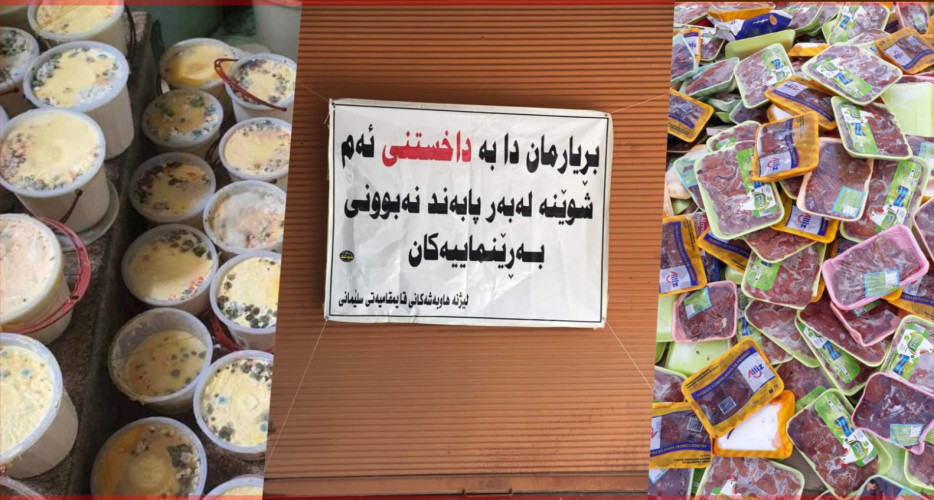
Peregraf- Ghamgin Mohammed
Dirty restaurants, food contaminated with rat feces, spoiled yogurt, and horse meat being sold as beef. All of these violations, which carry huge public health risks, often result in fines of only a few million Iraqi dinars or a short stint in jail.
In the first four months of this year alone, more than 228 tons of expired food and goods were seized in by the authorities in Sulaimanyah. This included children's food that was ready to be sold in local markets, according to an investigation by Peregraf.
"What kind of conscience do the owners of fast-food shops and juice and sweet shops have? How can they feed their children and families with this illegal money," demanded Sayran Ahmad, a local resident.
In the early morning hours of April 19, food inspectors raided the city’s animal market as a worker was slaughtering a horse with the intention of falsely marketing and selling it as other kinds of meat at a butcher shop.
During the raid, the inspectors sized sliced horse meat, cans, a mincing machine, knives, scales and a sign that read "goat meat and minced meat for 12,000 Iraqi dinars per kilo." The incident took place during Ramadan, when a kilo of meat cost more than 20,000 Iraqi dinars.
Rekan Jamal, head of the joint committees of the Sulaimanyah governor's office, told Peregraf that it was not known whether the horse had been stolen or was sick.
The committee has 44 sub-committees that inspect food and consumer goods and monitor prices in the governorate’s markets and stores.
Over the first four months of 2023, the committee closed down 243 business locations and issued courts summonses for 48 people, in addition to the tons of unhygienic food that it seized.
In April alone, the committees inspected about 9,000 locations and recorded more than 1,000 violations. It seized 44 tons of spoiled food and goods, closed down 75 businesses, and filed 15 lawsuits against business owners.
According to public health rules, small violations will result in an oral or a written warning. Penalties escalate from there to fines, closures, and court cases.
Fines fall into two bands, based on guidelines regulated by the Ministry of Finance. The first involve fines ranges between 10,000 and 500,000 Iraqi dinars and the second, more serious set of fines run between 1 million and 5 million Iraqi dinars.
"The committees will work more wth the second set of guidelines and we have submitted a proposal to the Ministry of Finance to increase the amount of the fines," Bestun Ali, head of the legal department of the governor's office, told Peregraf.
Incidents where businesses are selling rotten or contaminated food inevitably produce outrage from the public.
On April 30, food inspectors sized a large quantity of yogurt from a dairy on Mawlawi Street in the Sulaimanyah bazaar that was full of worms. Just days before, approximately 10 tons of carrots, cucumbers, and dates were destroyed due to spoilage and 8,700 kilograms of spoiled pickles were seized from a pickling warehouse.
"The sale of all this dirty and poor-quality food is also the fault of the citizens," argued Danar Abdulla, a Sulaymaniyah resident.
"The committees of the governor's office announce daily who sells spoiled and expired food, but the next day people go back and buy spoiled and low-quality foods again. Citizens must punish [business owners] by not buying food from them again," he explained.
The same conditions exist across the Kurdistan Region. There is not a month or a week that the market surveillance committees do not seize tens of tons of expired or contaminated food and goods from shops, markets, and restaurants.
Across the four governorates, inspectors seized 1,084,764 tons of spoiled food during the first six months of 2022, according to official statistics from the Trade Supervision Directorate.
The governor’s office regularly publishes the names and offenses of violators and the financial penalties assessed to them, but it does not publish if additional punishments like jailtime are given out. Those sentences are regulated by the Kurdistan Region’s Consumer Protection Law No. 9 of 2010.
"The law itself is a weak law and, for the worst cases, the punishment for violators is imprisonment for no more than three months," said lawyer Shalaw Abubakr.
Abubakr believes that implementation of the law is "very limited" and noted that the law had "previously been suspended by the government on the pretext of passing a better law."
Some cases end up being prosecuted under Article 240 of the Iraqi Penal Code, which is related to the violation of decisions and instructions of government officials. It can result in six months in prison or a fine.
Public health and food safety experts allege that markets are not properly monitored and supervised for potential violations.
"The situation must be controlled at the borders. Banned and expired food must not be smuggled in," Lashkar Hamid, a nutritionist, told Peregraf.
He suggested that everyone whose job involves handling food should receive training and certifications regarding food safety.
"Apart from the arrogance of some employers and traders, I have noticed that most of the cases of expired food is the result of inexperience and a lack of knowledge about food handling, storage, preparation, and transportation by employers and employees," Hamid said.
Abubakr said that business owners and workers who violate public health and food safety rules in a serious manner should be blacklisted from working in food service and related fields and that this could be enshrined in law.
It is time to pass a law "to punish such criminals equal to the serious damage to life, health, and survival they inflict on citizens," he said.